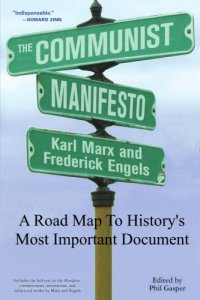
Ebook: The Communist Manifesto: A Road Map to History’s Most Important Political Document (with full table of contents)
- Year: 1848
- Publisher: Haymarket Books
- Language: English
- epub
[Now with full table of contents created from the The Manifesto in Outline from the Introduction]
Here, at last, is an authoritative introduction to history's most important political document, with the full text of The Communist Manifesto by Marx and Engels.
This beautifully organized and presented edition of The Communist Manifesto is fully annotated, with clear historical references and explication, additional related texts, and a glossary that will bring the text to life for students, as well as the general reader.
Since it was first written in 1848, the "Manifesto" has been translated into more languages than any other modern text. It has been banned, censored, burned, and declared "dead." But year after year, the text only grows more influential, remaining required reading in courses on philosophy, politics, economics, and history.
Apart from Charles Darwin's Origin of Species," notes the Los Angeles Times, the Manifesto "is arguably the most important work of nonfiction written in the 19th century." The Washington Post calls Marx "an astute critic of capitalism." Writing in The New York Times, Columbia University Professor Steven Marcus describes the Manifesto as a "masterpiece" with "enduring insights into social existence." The New Yorker recently described Karl Marx as "The Next Thinker" for our era. This book will show readers why.
"What is globalization? Here is one of the best answers. It is the 'constant revolutionizing of production' and the 'endless disturbance of all social conditions.' It is 'everlasting uncertainty.' Everything 'fixed and frozen' is 'swept away, ' and 'all that is solid melts into air.' Yes, you have read this before. It is from The Communist Manifesto, by Messrs. Marx and Engels." —The New York Times
"I pondered all these things, and how men fight and lose the battle, and the thing that they fought for comes about in spite of their defeat, and when it comes turns out not to be what they meant, and other men have to fight for what they meant under another name." —William Morris, A Dream of John Ball
"The best story I’ve ever heard about The Communist Manifesto came from Hans Morgenthau, the great theorist of international relations who died in 1980. It was the early seventies at CUNY, and he was reminiscing about his childhood in Bavaria before World War I. Morgenthau’s father, a doctor in a working-class neighborhood of Coburg, often took his son along on house calls. Many of his patients were dying of TB; a doctor could do nothing to save their lives, but might help them die with dignity. When his father asked about last requests, many workers said they wanted to have the Manifesto buried with them when they died. They implored the doctor to see that the priest didn’t sneak in and plant the Bible on them instead....
As the nineties end, we find ourselves in a dynamic global society ever more unified by downsizing, de-skilling, and dread—just like the old man said....At the dawn of the twentieth century, there were workers who were ready to die with The Communist Manifesto. At the dawn of the twenty-first, there may be even more who are ready to live with it. " —Marshall Berman, Unchained Melody
Phil Gasper is a professor of philosophy at Notre Dame de Namur University in northern California. He writes extensively on politics and the philosophy of science and is a frequent contributor to "CounterPunch."